
September 27
1422 The Treaty of Melno is signed, establishing the Prussian-Lithuanian border, which then remained unchanged for about 500 years. [For further information, click here.]
1840 Birth: Alfred Thayer Mahan: US navy admiral, influential author. The German Kaiser will memorize Mahan's work and build his navy accordingly. He was perhaps the most celebrated naval historian of his era, an influential promoter of United States naval and commercial expansion during America's rise to world power in the late nineteenth century. As the author of numerous articles and books, including the landmark The Influence of Sea Power Upon History, 1660-1783, Alfred Thayer Mahan was widely regarded as a brilliant naval theorist. From his writings, readers would never have guessed, however, that the renowned champion of the United States Navy hated the sea, and while an active-duty naval officer, lived in constant fear of ocean storms and colliding ships. [For further details, Click here.]
1860 (September 27–October 8): A US naval force invades revolution-torn Colombia in the Bay of Panama area. Subsequent US military interventions or incidents in Colombia and/or Panama: 1865, 1868, 1873, 1885, 1901, 1902, 1903–1914, 1918–1920, 1921, 1925, and 1989.
[See: Countdown to Infamy: Timeline to Pearl Harbor.] 1894 Birth: Lothar von Richthofen: German First World War fighter ace credited with 40 victories during the war. He was younger brother of top-scoring ace Manfred von Richthofen and a cousin of the Luftwaffe field marshal Wolfram von Richthofen. [For further details, Click here.]1914 World War I: Various: List Regiment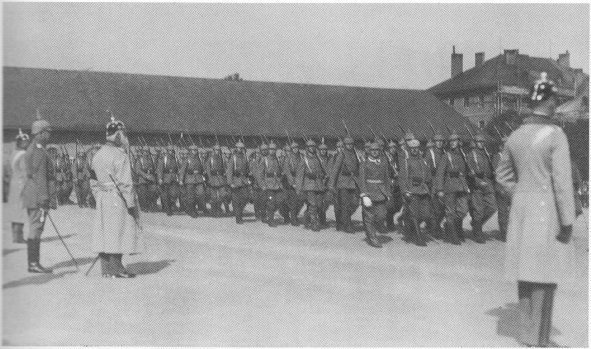
1915 World War I: List Regiment:

Gefreiter Adolf Hitler's 16 Reserve Infantry Regiment continues to occupy a position at Fromelles—pictured above in a drawing by Hitler—on a level field with water channels, willow trees and willow stalks. In the distance towards the enemy lines lies an insignificant wood with barbed wire entanglements. Under the direction of their defense-minded commander, Lieutenant General Gustav Scanzoni von Lichtenfels, the regiment works ceaselessly day and night to further fortify their position at Fromelles while fighting off repeated assaults by the enemy. [For further details, Click here.]
1916 World War I (Sep 24-26:
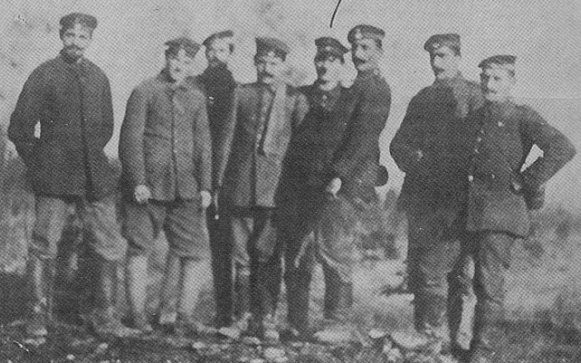
Hitler and his fellow dispatch runners
Gefreiter Adolf Hitler's 16th RIR is relieved by the 19th Bavarian Infantry Regiment, which is just back from the Somme, and whose men are telling horror stories about the fighting there. The 16th RIR are given a two day rest before being sent off to the Somme themselves. [For further details, Click here.]
1917 World War I: List Regiment: (September 11-30):
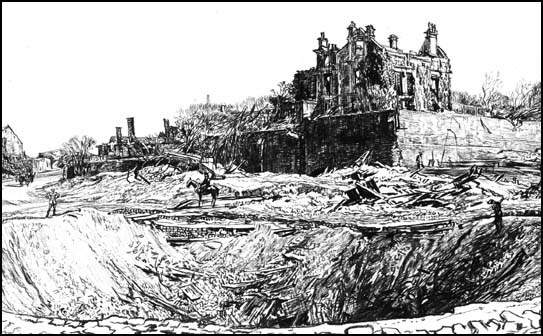
The regiment remains on light duty, guarding a camp near Mulhouse in Alsace, the only section of the front on German soil. During this slow time, not only will Hitler and his comrades get a well-deserved respite from the rigors of trench warfare, but the heavily censored news from the Front seems to be improving as well. The news of the collapse of the Russian Front and the further defeats of Italian arms is, however, tempered by the news that German munitions workers have gone on strike. This mix of events give an impression that the war on the Front is going well, but being undermined by defeatism on the home front. [For further details, Click here.]
1918 World War I: Various: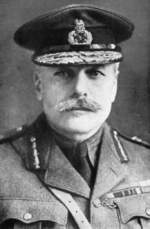
Hindenburg line: Haig's British army group flings itself against the Hindenburg line; but the drive soon slows down, in the face of a skillful German defense.
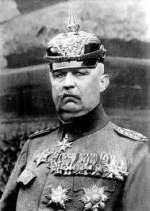
Ludendorff, in his anxiety to protect Cambrai, had been withdrawing troops from Flanders. Doubtless he remembered our experiences in the third battle of Ypres, and recalled the fact that the Flanders mud had there done more to check our progress than had the German troops. The season was already far advanced and there had been a good deal of rain. The state of his reserves was such that in order to meet the American advance west of the Meuse, and the British advance on Cambrai, both of them blows aimed at his vitals, he had to take chances somewhere, and he decided to take them on. [For further details, Click here.]
Middle East:
On Allenby's desert flank to the east, T.E. Lawrence (Lawrence of Arabia) and King Faisal cut the railway line at Deraa, while Allenby continues to press on toward Damascus. 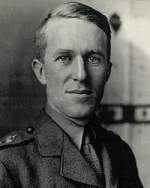
T.E. Lawrence
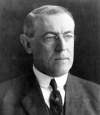
Wilson
An aggressive campaign was created by Secretary of the Treasury William Gibbs McAdoo to raise money from war-supporting Americans by selling the bonds. The government used famous artists to make posters, and used movie stars to host bond rallies. Al Jolson, Elsie Janis, Mary Pickford, Douglas Fairbanks and Charlie Chaplin were among the celebrities that made public appearances promoting the idea that purchasing a liberty bond was "the patriotic thing to do" during the era. Chaplin also made a short film, The Bond, at his own expense for the drive. [For further details, Click here.]
List Regiment (August 21-September 27):
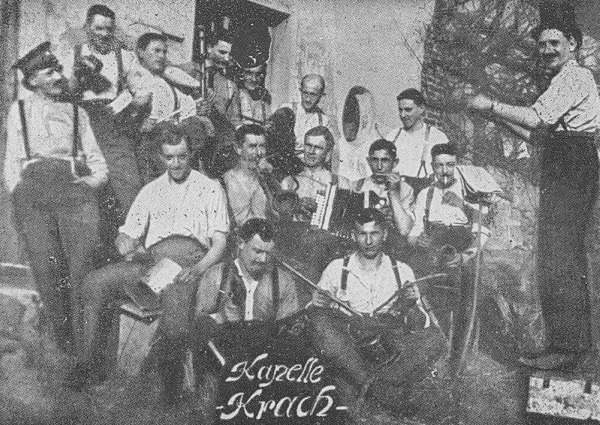
Gefreiter Adolf Hitler attends a signals training course in Nuremberg. [For further details, Click here.]
1923 Weimar: Bavaria: Fourteen mass demonstrations Hitler's NSDAP had planned to hold are banned by the Bavarian strong man, Gustav Kahr.There were many extreme nationalist groups in existence at the time all vowing to overthrow the Weimar government and restore Germany to greatness again. In early 1919 far left revolutionaries had declared Bavaria a communist republic. In May 1919, the Freikorps and army units had crushed the communist government, killing hundreds of opponents. By 1920 Bavaria was under the control of right wing nationalists led by Gustav Kahr. Hitler's brand of nationalistic and racist political views found fertile ground. [For further details, Click here.]
1928 The US announces that it will recognize the Nationalist Chinese Government.The years 1928–1937 were the years that the Kuomintang ( KMT ) government had its best chance of reforming, rebuilding, and integrating a fractured China. It was during this decade that the KMT had its greatest potential to create the China envisioned by Sun Yat-sen. To many, it appeared as if the KMT government was in fact the revolutionary and reforming government it claimed to be. Beginning with the apparent success of the Northern Expedition, to the reform of the financial and education systems, the recovery of foreign concessions, and the modest increase in industrialisation, the KMT appeared to be well underway in its attempt to rebuild China into an integrated nation. Yet as important as these successes were, the reality was that the KMT, as a politically unifying force, was inherently flawed. [For further details, Click here.]
1933 Various:
Church and Reich: Ludwig Mueller, bishop of Prussia and a confidant of Hitler, is named Reichsbishop. (THP)
Boycott: The Canadian garment industry joins the anti-Nazi boycott. 1935 Various: Volkishness: Otto Rahn writes a letter to Weisthor (Wiligut) excitedly describing the places he has been visiting in his hunt for grail traditions in Germany. Rahn asks for complete confidence in the matter with the exception of Himmler. (THP) Holocaust: Waldemar Gurian—a German Catholic writer in exile—writes that the Nuremberg ordinances are "only a stage on the way toward the complete physical destruction of the Jews." (THP) 1936 Holocaust: The Gestapo closes the Association of Independent Artisans of the Jewish Faith, a German Jewish mutual aid society. 1938 Various:Sudeten Crisis
: Hitler again warns that he will crush Czechoslovakia if his demands concerning the Sudetenland are not met. The British Home Fleet is mobilized in response to the Czechoslovakian crisis. Franklin Roosevelt appeals to Hitler for peace:
On this day in 1938, President Franklin Roosevelt writes to German Chancellor Adolf Hitler regarding the threat of war in Europe. The German chancellor had been threatening to invade the Sudetenland of Czechoslovakia and, in the letter, his second to Hitler in as many days, Roosevelt reiterated the need to find a peaceful resolution to the issue.
The previous day, FDR had written to Hitler with an appeal to negotiate with Czechoslovakia regarding Germany's desire for the natural and industrial resources of the Sudetenland rather than resort to force. Hitler responded that Germany was entitled to the area because of the "shameful" way in which the Treaty of Versailles, which had ended World War I, had made Germany a "pariah" in the community of nations. The treaty had given the Sudetenland, a territory that was believed by Hitler and many of his supporters to be inherently German, to the state of Czechoslovakia. Therefore, Hitler reasoned, German invasion of the Sudetenland was justified, as annexation by Germany would simply mean returning the area to its cultural and historical roots. Hitler assured Roosevelt that he also desired to avoid another large-scale war in Europe.
In his letter of September 27, Roosevelt expressed relief at Hitler's assurances but re-emphasized his desire that "negotiations [between Germany and Czechoslovakia] be continued until a peaceful settlement is found." FDR also suggested that a conference of all nations concerned with the current conflict be convened as soon as possible. He appealed to Hitler's ego, saying "should you agree to a solution in this peaceful manner I am convinced that hundreds of millions throughout the world would recognize your action as an outstanding historic service to all humanity." FDR then assured Hitler that the U.S. would remain neutral regarding European politics, but that America recognized a responsibility to be involved "as part of a world of neighbors."
In the end, Hitler ignored the international community's pleas for a peaceful solution and invaded Czechoslovakia in March 1939. The invasion was just the first in Hitler's quest to control Europe and create a "Third Reich" of German geopolitical supremacy. (History.com)
On this day in 1939, 140,000 Polish troops are taken prisoner by the German invaders as Warsaw surrenders to the superior mechanized forces of Hitler's army. The Poles fought bravely, but were able to hold on for only 26 days.
On the heels of its victory, the Germans began a systematic program of terror, murder, and cruelty, executing members of Poland's middle and upper classes: Doctors, teachers, priests, landowners, and businessmen were rounded up and killed. The Nazis had given this operation the benign-sounding name "Extraordinary Pacification Action." The Roman Catholic Church, too, was targeted, because it was a possible source of dissent and counterinsurgency. In one west Poland church diocese alone, 214 priests were shot. And hundreds of thousands more Poles were driven from their homes and relocated east, as Germans settled in the vacated areas.
This was all part of a Hitler master plan. Back in August, Hitler warned his own officers that he was preparing Poland for that "which would not be to the taste of German generals"—including the rounding up of Polish Jews into ghettos, a prelude to their liquidation. All roads were pointing to Auschwitz. (History.com)
For Reich Foreign Minister in person. Telegram from Helsinki No. 245 of the 26th: The Foreign Minister notified me of demands made by Russia on Estonia and observed that Finland was prepared to improve her relations with Russia, but would never accept such demands and would rather let it come to the worst. I pointed to the difference between the position of Estonia and that of Finland and advised the Foreign Minister to seek the security of his country in good relations with Germany and Russia. The Foreign Minister agreed and emphasized complete elimination of English influence from the Baltic area.
The Foreign Minister conveyed a request to inform the Reich Foreign Minister of the following, if possible before his departure for Moscow: The Estonian Government, under the gravest threat of imminent attack, perforce is prepared to accept a military alliance with the Soviet Union. Minister Selter with staff will fly to Moscow tomorrow, Wednesday, to negotiate. Aim of negotiation: Framing of a treaty in such manner that the sovereignty and internal security of the country are preserved and the Estonian non-aggression pact kept intact. Hence they intended to propose, in connection with the mutual assistance obligation of the contracting parties, to except the existing non-aggression pacts with third countries. It is further desired that naval and air bases should be made available only in case of war, when assistance obligation comes into play; in peace time as far as possible only preparation of the bases. The Russians first demanded Reval as a naval base, but seem prepared to agree to Baltischport or a port on Ösel. The Estonians wish if possible to grant air bases only on island. The general tendency is to meet the demands only as far as necessary to prevent an attack and maintain existing good relations with Germany." Note: Reich Foreign Minister Ribbentrop begins a three day visit to Moscow.
Pray examine and advise upon a proposal to establish a minefield, blocking Norwegian territorial waters at some lonely spot on the coast as far north as convenient. If the Norwegians will do this themselves, well and good. Otherwise a plan must be made for us to do it.
Holocaust: Various The RSHA (Reichssicherheitshauptamt, or Reich Security Head Office) begins operation.
For the next six years Eichmann's office was the headquarters for the implementation of the 'Final Solution'; though it was not until the summer of 1941 that his 'resettlement' department began the task of creating death camps, developing gassing techniques and organizing the system of convoys that were to take European Jewry to their deaths.
Poland: Near Grabowiec, 150 Polish policemen, 4 NCOs and 6 officers among 5,000 taken prisoner, are executed by the Soviets with the aid of Ukrainian and Jewish militias. (THP) Bulgaria: The government moves to suppress growing anti-Semitic violence. 1940 World War II: The Tripartite Pact is signed by Germany, Italy, and Japan: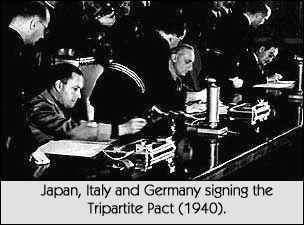
On this day in 1940, the Axis powers are formed as Germany, Italy, and Japan become allies with the signing of the Tripartite Pact in Berlin. The Pact provided for mutual assistance should any of the signatories suffer attack by any nation not already involved in the war. This formalizing of the alliance was aimed directly at "neutral" America—designed to force the United States to think twice before venturing in on the side of the Allies.
The Pact also recognized the two spheres of influence. Japan acknowledged "the leadership of Germany and Italy in the establishment of a new order in Europe," while Japan was granted lordship over "Greater East Asia."
A footnote: There was a fourth signatory to the Pact-Hungary, which was dragged into the Axis alliance by Germany in November 1940. (History.com)
1941 Holocaust:
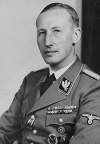
Himmler comes through with a long-delayed promotion of Heydrich to Obergruppenfuehrer (Lieutenant General) and general of the police. (THP)
1942 World War II: Various: Stalingrad: German forces succeed in capturing most of the strategic Mamayev Kurgan hill, and penetrating the heavily defended Red October and Barricades housing estates. [See: Was Adolf Hitler a 'Great' Military Leader?] Joseph Goebbels delivers a pep-talk to the Reich: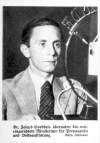
One can argue about whether the English and Americans, along with their Jewish blowhards, were forced by domestic political reasons to reveal so openly their secret intentions toward us. Whatever the reason, it hardly needs to be said that their propaganda has done them serious harm, both in the world and above all with respect to our own people. It may be that, given their eternal military defeats, the English and Americans need to let off steam occasionally with outbursts of rage and revenge. No one can doubt, however, that we can only welcome their revelations. [For more, Click here.]
Australian forces defeat the Japanese on New Guinea in the South Pacific.Having been repulsed in this attempt to take Port Moresby by sea, and another attempt in August 1942 by the Australians at Milne Bay, the Japanese pushed toward their objective over the Owen Stanley Mountains from the Buna-Gona area in southeastern New Guinea. Two Australian divisions, one U.S. Army division, and a separate U.S. Army regiment had to be committed to the fight. [For further details, Click here.]
1943 World War II: General withdrawal of all German forces in the Ukraine to positions on the west bank of the Dnepr river. 1944 World War II: Various:In 1944 Greece is liberated from the German occupation though the celebration is a short one. The victorious resistance fighters of the left and the right have already begun to fight each other. With the King, the government and the army still in Egypt and the collapse of the occupation government, it is the Greek communists who control most of the country. [For further details, Click here.]
Field-Marshal Smuts to Churchill: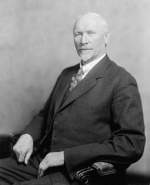
[It] has to be feared that after the war against Germany is won war fever in the United States will cool off and American ardor be transferred to trade and industry . . . . Division of zones in Germany between the United Kingdom and United States appears fair. The destiny of Prussia under occupied by the Russians seems likely to be a Bolshevised Soviet province or protectorate. So much for Hitler's dream. But it shows that Europe's 2,000 year old problem of Germany will remain as great as ever.
Churchill to Stalin:
[It] is the Russian Army that tore the guts out of the German military machine, and is at the present moment holding by far the larger portion of the enemy on its front. 2. I have just returned from long talks with the President, and I can assure you of our intense conviction that on the agreement of our three nations . . . stand the hopes of the world. I feel very sorry to learn that you had not been feeling well lately, and that your doctors did not like your taking long journeys by air . . . but it may be the course of the war, even before Christmas, may alter the picture along the Baltic shore to such an extent that your journey will not be tiring or difficult.
I most earnestly desire, and so, I know, does the President, the intervention of Soviet Russia in the Japanese war, as promised by you at Teheran as soon as the German Army was beaten and destroyed. The opening of a Russian military front against Japan would force them to burn and bleed, especially in the air, in a manner which would vastly accelerate their defeat. From all I have learned about the internal state of Japan and the sense of hopelessness weighing on their people, I believe it might well be that once the Nazis are shattered a triple summons to Japan to surrender, coming from our three Great Powers, might be decisive. Of course, we must go into all these plans together.
1946 Nuremberg Tribunal
: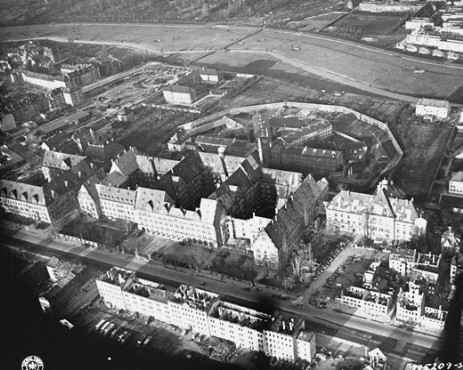
The justices continue to discuss verdicts in the Major War Criminals Trial. (See: 30 September 1946)
1959 Khrushchev ends trip to the United States: On September 27, Khrushchev concluded his visit. He met briefly to exchange goodbyes with Eisenhower and then was escorted to the airport by Vice President Richard Nixon. A few months earlier, at the American National Exhibition in Moscow, Nixon and Khrushchev had engaged in the famous “kitchen debate” concerning the battle between communism and capitalism. Now, however, the two men were exhibited great goodwill toward each other. With a 21-gun salute and a U.S. military band playing both the American and Soviet national anthems, Khrushchev boarded a Russian aircraft and returned to the Soviet Union. [For further information, click here.]
1961 Spandau Prison: From Spandau: The Secret Diaries, by Albert Speer:
Abruptly, Schirach has aggravated his ailments, while Hess laconically declares, "A work schedule! Don't make me laugh. The doctors have all certified my illness, That doesn't apply to me at all."
[See: Are There Any Lasting Effects From the Nuremberg Trials?]Edited by Levi Bookin (Copy editor) Click to join 3rdReichStudies Disclaimer: This site includes diverse and controversial materials--such as excerpts from the writings of racists and anti-Semites--so that its readers can learn the nature and extent of hate and anti-Semitic discourse. It is our sincere belief that only the informed citizen can prevail over the ignorance of Racialist "thought." Far from approving these writings, this site condemns racism in all of its forms and manifestations.
levi.bookin@gmail.com










Fair Use Notice: This site may contain copyrighted material the use of which has not always been specifically authorized by the copyright owner. We are making such material available in our efforts to advance understanding of historical, political, human rights, economic, democracy, scientific, environmental, and social justice issues, etc. We believe this constitutes a "fair use" of any such copyrighted material as provided for in section 107 of the US Copyright Law. In accordance with Title 17 U.S.C. Section 107, the material on this site is distributed without profit to those who have expressed a prior interest in receiving the included information for research and educational purposes. If you wish to use copyrighted material from this site for purposes of your own that go beyond 'fair use', you must obtain permission from the copyright owner.
Please Note: The list-owner and moderators of 3rdReichStudies are not responsible for, and do not necessarily approve of, the random ads placed on our pages by our web server. They are, unfortunately, the price one pays for a 'free' website.



